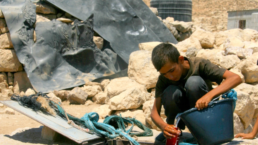The Hague can only prosecute four types of crimes. Ecocide could become the fifth.
by Lylla Younes, Grist
When reports emerged in late December that the Israeli military planned to pump seawater into the underground tunnel networks used by Hamas fighters in Gaza, scientists and advocates around the world raised alarm over the prospect of an environmental disaster. Flooding the tunnels threatened to permanently salinate the land, making it impossible to cultivate crops. Seawater could also seep underground and into an aquifer that the majority of Gazans rely on for water. Palestinian rights groups and protesters around the world were already accusing the Israeli government of committing genocide against the Palestinians, with more than 20,000 killed by Israeli bombings on Gaza since Hamas’ attack on southern Israel last October. Now, another term entered the conversation: ecocide.
Broadly defined as the severe, widespread, and long-term destruction of the environment, ecocide isn’t considered a crime under international law. At the moment, the only way to prosecute vast environmental destruction internationally is as a war crime in the International Criminal Court, or ICC, based in The Hague, Netherlands. But a growing number of countries, advocates, and legal experts are trying to change that. While some, like representatives from the island nation of Vanuatu, are motivated by the escalating climate crisis, and others, like Ukraine, are more interested in prosecuting environmental war crimes, they ultimately share the same goal: making ecocide the fifth international crime the ICC could prosecute, along with crimes against humanity, war crimes, crimes of aggression, and genocide.

Their campaign reached a major milestone in 2021, when a panel of legal experts worked over six months to create a legal definition of ecocide. Afterward, a number of countries and the European Union incorporated at least part of this definition into new legislation, which, experts said, increases the likelihood that it will eventually be adopted by the International Criminal Court. While there are plenty of obstacles to making such a law effective, advocates interviewed for this story said that the symbolic importance could have far-reaching consequences. Creating a law against ecocide could eventually force government officials and corporate executives to think twice before polluting rivers, poisoning the air, or destroying the land.
Recent Posts
How to Organize Safely in the Age of Surveillance
February 22, 2026
Take Action Now From threat modeling to encrypted collaboration apps, we’ve collected experts’ tips and tools for safely and effectively building a…
‘The Siege Must Be Broken’: Countries Called to Ship Fuel to Cuba After Trump Tariffs Struck Down
February 21, 2026
Take Action Now The US Supreme Court’s ruling “implies that Trump’s recent order imposing tariffs on countries selling oil to Cuba exceeds the…
Elite Depravity in Imperial Decline, A Zero Hour Conversation With Richard Wolff
February 20, 2026
Take Action Now “The system self-selects for psychopathy… the most sociopathically obsessive competitor and accumulator of personal power and…
Economics of Health For All: The Plan to Put Health at the Heart of the Global Economy
February 20, 2026
Take Action Now At the World Health Assembly in May, member states may endorse an unprecedented strategy declaring that health is not a cost – but…




